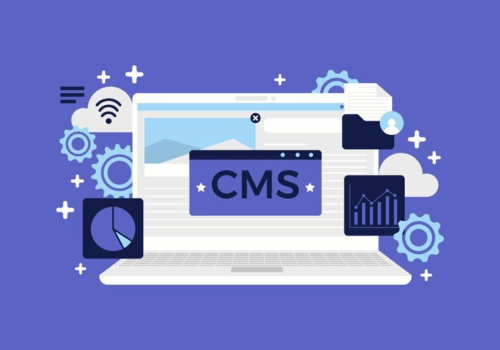Comparing WordPress and HubSpot CMS: A Detailed Guide
Selecting the right content management system (CMS) is crucial for the success of your website. In this article, we delve into a detailed comparison between two leading CMS choices: WordPress (WP) and HubSpot CMS (HS). As we compare these platforms, we’ll discuss their features and functionalities, from user access to data and analytics to blog management, security, and search engine optimization capabilities.
This guide aims to provide you with a clear understanding of each system’s strengths and weaknesses, assisting you in making an informed decision for your website’s needs.
WP vs HS: Core Features and General Overview
WP and HS are both renowned for their CMS capabilities, but they approach website management differently. WP, a widely adopted CMS, powers an impressive number of websites worldwide. Its open-source nature offers extensive customization and flexibility.
In contrast, HS is a comprehensive marketing solution, integrating a CMS with robust marketing, analytics, and customer relationship management tools. This section will explore the unique aspects of each system, including their ease of use, customization options, and overall functionality.
Access to Data
Access to website data is pivotal for backups, analytics, and site migration. WP, being open-source, offers complete access to site data. Users can freely modify and extract their website information. HS, while not open-source, supports data exportation across its marketing, CRM, and CMS platforms. It’s crucial to understand that extracting data from either CMS may require specialized knowledge or assistance from a web developer.
Analytics and Visitor Tracking
Analytics play a key role in understanding website performance. HS offers integrated analytics tools within its CMS, providing a seamless experience for tracking visitor behavior and site performance. WP, on the other hand, requires additional plugins for analytics functionality. Popular choices include JetPack and Monster Analytics, which can be integrated easily. For users seeking a blend of both platforms, WP can incorporate HS’s analytics for a comprehensive view.
Content Management and Blogging
Both WP and HS offer robust blogging capabilities. WP is renowned for its ease of use in content creation and management, with an array of themes and plugins to enhance the blogging experience. HS also offers efficient blogging tools, integrated with its marketing and SEO features. This section will compare the blogging interfaces, customization options, and content management features of both CMS platforms.
Extensibility and Integrations
Extensibility is a key consideration in CMS selection. WP’s vast ecosystem of plugins allows for extensive customization and integration with third-party services. HS, with its marketing-centric approach, offers seamless integration with its suite of tools. This section will explore how both platforms facilitate website growth and functionality through integrations and extensions.
Security Measures and Reliability
Security is a top priority in CMS choice. WP, with its widespread use, is a frequent target for security threats but has a vast community constantly working on security enhancements. HS, known for its robust security measures, offers a secure hosting environment with regular updates. This section will delve into the security protocols, updates, and support provided by both CMS platforms.
SEO Capabilities and Tools
Effective search engine optimization (SEO) is vital for website visibility. WP offers SEO plugins like Yoast SEO, which provide comprehensive tools for optimizing content. HS, with built-in SEO tools, integrates SEO into the content creation process. This section will compare the SEO functionalities of both platforms, discussing how they aid in improving website rankings.
Theming and Customization
The ability to customize the look and feel of a website is crucial. WP boasts a vast library of themes and customization options, catering to diverse design preferences. HS offers customizable templates geared towards marketing efficiency. We’ll examine the theming capabilities, customization flexibility, and design options available in both CMS platforms.
This comprehensive comparison aims to provide insights and in-depth analysis of WP and HS, enabling you to choose the CMS that best fits your website’s needs and goals.
Blog Management and Content Creation
Blogging remains a vital component in content marketing, driving traffic and reinforcing brand trust. Effective blog management tools are therefore essential in a CMS.
HS has dedicated efforts to create an intuitive blogging platform. The HS blogging interface offers a “what you see is what you get” editor, streamlining the process of writing, formatting, and editing blog posts. Notably, HS allows for easy scheduling of posts and the integration of calls to action (CTAs) directly into the content, which is crucial for lead generation and user engagement.
WP, originally established as a blogging CMS, maintains its superiority in this area. The WP platform simplifies the process of composing, formatting, editing, and scheduling posts, even for users with no coding knowledge. Its versatility is highlighted through:
- Ease of content creation and management;
- Wide range of customizable themes specifically for blogging;
- A plethora of plugins to enhance blogging capabilities, including page builders and Gutenberg editor;
- Options to add visually appealing and trackable CTAs using various plugins.
While HS offers a streamlined blogging experience, its limited extensibility without developer intervention is a constraint. In contrast, WP’s extensible nature allows for the addition of functionalities through plugins, offering a more flexible and adaptable blogging environment.
Winner: WordPress
The flexibility and extensive customization options of WP, especially in blog management, grant it an edge over HS in this round.
Adaptability and Personalization in Digital Platforms
Adaptability is paramount for businesses aiming to forge a distinctive online identity and infuse unique functionalities into their digital landscapes.
HS, as proprietary software, adheres to a specific structural design. This approach means that the extent of customizability and unique features on HS’s platform is tightly regulated. Recently, HS ceased accepting new contributions to its Asset Marketplace, focusing instead on refining its themes and template offerings.
HS utilizes HubL, a specialized programming language akin to Python, for crafting modules within its CMS environment. This necessitates dedicated HS development skills for advanced customizations or augmenting functionalities.
Conversely, WP is a frontrunner in adaptability:
- It hosts a vast array of both complimentary and premium add-ons via its extensive marketplace and independent vendors;
- The open-source structure of WP is familiar to a broad spectrum of developers, easing the search for custom development skills;
- Enterprises can commission bespoke plugin development, ensuring a digital experience tailored to their specific requirements;
- The open-source nature of WP and its extensive developer community significantly simplifies the process of sourcing qualified assistance for bespoke customizations.
Winner: WP
WP’s extensive add-on marketplace and universally recognized open-source framework establish it as the premier choice for customization. WP’s empowerment of users to modify and personalize their digital presence secures its victory in this category for businesses seeking a unique web identity.
Safeguarding and Data Protection
The protection of sensitive information, be it your own or clients, is of utmost importance. Here’s a look at how WP and HS measure up in this area.
In WP, the onus of selecting a secure hosting service lies with the user, necessitating a reliable third-party web hosting solution. There are several esteemed hosting services, such as DreamHost. However, WP’s extensive theme and add-on library require diligent maintenance to keep them updated, a factor that can heighten security risks if neglected.
In contrast, HS’s CMS offers robust security features:
Automated updates ensure the latest security enhancements are always applied.
Continuous surveillance for potential security threats.
In-built security measures and certifications, reducing the need for manual security management.
Winner: HS (with a caveat)
For those prioritizing a secure CMS with automated, comprehensive security measures, HS is the go-to choice. WP, while offering more customization, requires proactive security management in collaboration with a premium hosting provider.
Web Page Construction and Design
The simplicity of creating web pages is an essential attribute of any CMS.
HS’s CMS features an intuitive drag-and-drop page builder, equipped with default modules for essential web elements like navigation menus, buttons, subscription forms, and calls-to-action (CTAs). Although HS’s page builder is user-friendly, it may lack the depth of customization needed for specific design aspirations.
WP, celebrated for its flexibility, provides access to sophisticated visual builders such as ThemeFusion’s Avada and the Elementor plugin. These tools offer:
- More intricate customization options than HS;
- Integration with WP’s native page editor, facilitating complex layout designs;
- Extensive documentation, enabling developers to create bespoke elements as required.
Winner: WP
While HS offers initial user-friendliness, the extensive customization possibilities and depth offered by WP’s diverse page builders make it the favored choice.
Search Engine Optimization (SEO)
Effective SEO is crucial for online prominence and search engine rankings.
HS’s CMS comes equipped with in-built SEO tools, providing:
- Tools for keyword research to inform content strategy;
- Analytical graphs for effective content structuring;
- On-page SEO recommendations for blog optimization.
However, hosting a blog on HS may affect SEO due to the potential treatment of the blog URL as a separate entity.
WP, on the other hand, supports integration with digital tools like SEMRush for keyword research and plugins such as Yoast SEO for comprehensive SEO management. Even the free version of Yoast SEO offers:
- Optimization for keywords and Google search snippets;
- Automated XML sitemap creation for enhanced indexing;
- Detailed and customized structured metadata control on an individual post basis.
Winner: WP
Given the comprehensive nature of WP’s SEO plugins, WP equals or surpasses HS in SEO capabilities, especially regarding structured metadata control. This flexibility makes WP the superior choice in this round.
Theme Design and Aesthetics
A cohesive and visually compelling theme is vital for any website. Let’s compare the theme support offered by HS and WP.
HS generally requires a web developer or agency for custom theme creation, involving knowledge in HTML, CSS, JavaScript, and HubL. This can be a significant hurdle for those without coding expertise, limiting their ability to customize HS templates personally.
In stark contrast, WP boasts an extensive array of themes across various marketplaces. These themes not only ensure a consistent aesthetic across the website but also provide:
- Wide-ranging customization options via admin panel settings, often eliminating the need for coding skills;
- The ability for developers to further modify and enhance themes, suiting more specific design requirements;
- An almost limitless range of theming options due to the sheer volume and diversity of themes available.
Winner: Unquestionably WP
WP’s versatility, straightforward customization process, and sheer breadth of theme options render it the superior choice for users seeking diverse and user-friendly theming capabilities.
Scalability and Growth Potential
As businesses evolve, so do their digital needs. Here’s how HS and WP accommodate growth and scalability:
- HS: Designed for businesses seeking an integrated marketing solution, HS offers scalability primarily through its suite of marketing tools and CRM integration. However, its scalability in terms of website functionality and design customization is somewhat limited without specialized developer input;
- WP: Known for its flexibility, WP excels in scalability. Users can easily add new features and functionalities through plugins and themes, making it a suitable choice for businesses of varying sizes and needs.
WP’s scalability is characterized by:
- Ease of adding new functionalities with plugins;
- Capability to handle increasing traffic and content as the business grows;
- Flexibility to redesign and adapt the website to changing market trends.
Both platforms offer scalability, but WP provides more freedom and options, particularly for users who wish to expand and customize their digital presence without extensive technical knowledge.
Integration with Other Platforms
In today’s digital ecosystem, the ability of a CMS to integrate seamlessly with other platforms and tools is crucial. Here’s how HS and WP stack up in terms of integration:
HS offers built-in integrations with its suite of marketing, sales, and service software, providing a cohesive user experience. However, its integration with external tools and platforms may be limited compared to WP.
WP, with its open-source nature, offers extensive integration possibilities. Users can connect their WP website with a myriad of external tools and platforms, including e-commerce solutions, social media, email marketing tools, and analytics platforms. This versatility makes WP a more adaptable choice for businesses that rely on a diverse set of digital tools.
When considering a CMS, it’s essential to evaluate how well it can integrate with your existing digital ecosystem and whether it can support your future integration needs.
In exploring the key differences between AEM and WP, one will find contrasting approaches to content management and digital experience creation, offering unique advantages based on organizational requirements.
Conclusion
Throughout this article, we have thoroughly compared HS and WP across multiple critical aspects of content management systems. From the introduction, where we set the stage for this comparison, to the detailed rounds focusing on specific features such as security, page-building, SEO, and theming, it’s evident that each platform has its strengths.
WP emerges as a more versatile and customizable option, particularly excelling in theming, extensibility, and blog management. Its vast ecosystem of plugins and themes makes it an ideal choice for users seeking flexibility and ease of customization.
HS, on the other hand, shines in its integrated marketing tools, robust security features, and streamlined user experience, though at the expense of some customization and extensibility.
Ultimately, the choice between HS and WP depends on your specific needs and priorities. Whether you prioritize integrated marketing tools and security (HS) or flexibility and a wide range of customization options (WP), both platforms offer robust solutions for content management and digital presence. As you consider your unique web needs, including page building, theming, and scalability, this comprehensive comparison will serve as a guide to making an informed decision.





